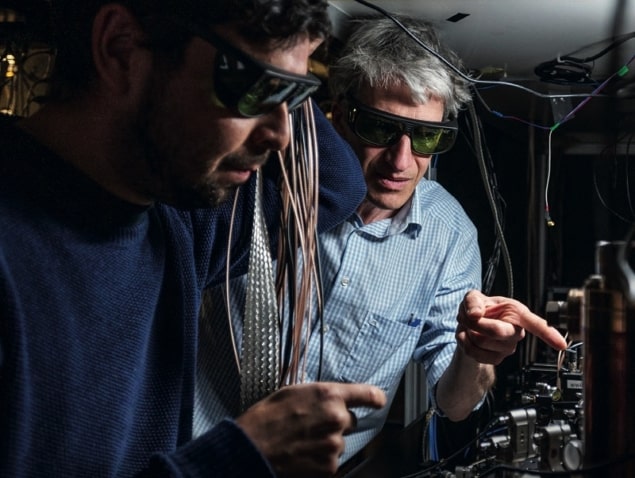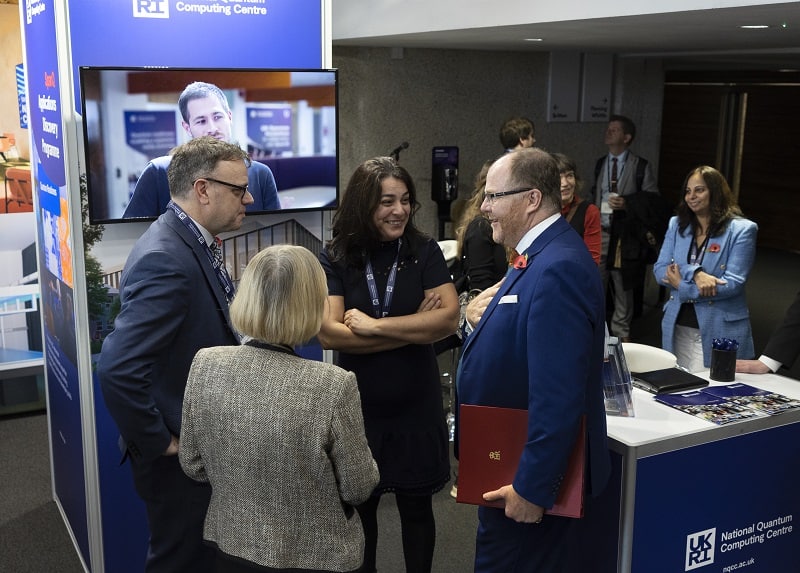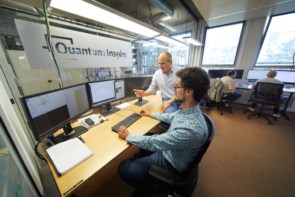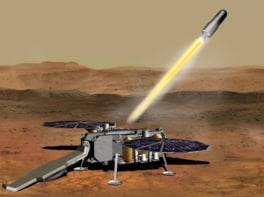Scientists and engineers with different skills, knowledge and experience are pooling their resources to tackle the challenge of scaling up quantum computers to deliver a computational advantage

The 2022 Nobel Prize for Physics recognized pioneering experiments by Alain Aspect, John Clauser and Anton Zeilinger that for the first time demonstrated the potential of quantum systems for processing information. Several decades later, scientists and engineers in both industry and academia are building on these achievements to create functioning quantum computers that offer a tantalizing glimpse of their potential to tackle complex problems across a range of applications.
While the progress to date has been impressive, much more work is needed to create quantum computers that can outperform their classical counterparts. Today’s small-scale quantum processors are now pushing the number of qubits towards the 100–1000 range, but they are affected by noise and errors that limit their computational capabilities. Scaling up the technology to achieve a broad quantum advantage will take scientific ingenuity and engineering know-how across many different disciplines, as well as close collaboration between the academic and commercial sectors.
In the UK that collaboration has been driven through the National Quantum Technologies Programme (NQTP), a £1bn initiative that since 2014 has supported technology hubs in quantum sensing, imaging, communications and computing. “We have a rich ecosystem that is working together to push the scaling up of quantum computers to deliver useful applications,” says Elham Kashefi, professor of quantum computing at the University of Edinburgh and a CNRS director of research at the Sorbonne University in Paris.
Kashefi has just been appointed chief scientist of the UK’s National Quantum Computing Centre (NQCC), a facility launched in 2020 as a flagship programme of the NQTP. The NQCC aims to accelerate the delivery of quantum computing in the UK by partnering with research groups and the commercial sector to address scaling challenges.
“Part of my role with the NQCC will be to bring together application developers and end users to push forward the development of useful devices,” says Kashefi. “We are now at the stage where the requirements of the algorithms can influence the design of the hardware, allowing us to close the gap between the desired use-case and the emerging machine.”

With a background in computer science, Kashefi has long been an advocate for the role that software and algorithms can play in developing quantum solutions. She co-ordinated the software research programme within the Quantum Computing and Simulation (QCS) Hub, a consortium of UK universities supported by the NQTP that focusses on the critical scientific challenges for quantum computing. The hub has been the launchpad for a number of start-up companies championing different hardware and software solutions, and now works with the NQCC to grow the UK quantum computing ecosystem by translating research strengths into innovative technologies.
As part of her new role, Kashefi will work with the NQCC to establish a quantum software laboratory at the University of Edinburgh, a core initiative that will further extend the national footprint of the NQCC’s programme. “The scalability challenge we are now facing with the physical qubits is a problem that computer science and applications software can help to solve,” she says. “We can optimize the requirements for the qubits by co-developing the software and control systems to address the needs of the application.”
Such co-development demands a multidisciplinary approach that combines knowledge of quantum hardware and information processing with the expertise of mathematicians and computer scientists who understand how to tackle complex computational problems.
“Connecting with the wealth of knowledge we have in classical computer science will enable us to optimize system architectures and control systems, as well as protocols for error mitigation and correction, to obtain the best result from the hardware platforms,” says Kashefi. “As an example, people working in high-performance computing have spent a lot of time figuring out how to solve optimization problems, and their input will help to accelerate the development of quantum solutions that deliver a computational advantage.”
One promising avenue is the development of hybrid approaches that combine emerging quantum devices with classical computing infrastructure. As an example, the NQCC is a partner in the QuPharma collaboration, a £6.8m project that aims to radically reduce the time needed to run molecular simulations for drugs discovery.
Led by hardware developer SEEQC UK and involving the German pharmaceutical giant Merck KgaA, the project aims to combine SEEQC’s quantum processor with a classical supercomputer to create a more powerful platform for drug design. “We need to understand the pain points in industry to enable us to translate them into research problems that quantum computing might be able to solve,” points out Kashefi.
Such collaborative projects draw on the scientific expertise harboured within the UK’s academic sector, which has nurtured world-class research in quantum theory, software and algorithms as well as experimental work investigating all the leading qubit architectures.
“As someone who is focused on applications and verification, I have been thrilled to have access to qubit platforms ranging from superconducting circuits and trapped ions through to photonics and silicon-based devices,” says Kashefi. “When we write the code we need to be aware of the capabilities and limitations of each qubit platform, since some applications may be more suited to the noise model or connectivity offered by a particular hardware solution.”
The emerging quantum industry also benefits from the strength of the science base within the UK, with many quantum start-ups maintaining close links with their former research groups to advance the technology and accelerate their development programmes.
“The academic sector acts as an ideas factory,” says David Lucas, the principal investigator of the QCS Hub and co-leader of the trapped-ion quantum-computing group at the University of Oxford. “Scaling up the technology is an engineering challenge that extends beyond the capabilities of a single university research department.” Indeed, one key role for the NQCC is to provide the infrastructure and facilitate the collaboration that will be needed to address these engineering challenges.
That synergy between industry and academia has been particularly effective in the development of the Maxwell platform, a commercial neutral-atom quantum-computing system demonstrated by M Squared, a developer of photonics and quantum technologies, at the UK’s National Quantum Technologies Showcase in November 2022. The current version of the system can support 100 qubits, and M Squared CEO Graeme Malcolm says there is a clear route to scaling the technology to 400 qubits and beyond.
“To create Maxwell we formed a strategic partnership with the University of Strathclyde, which has provided our company with access to world-class breakthrough physics,” says Malcolm. “It has been great to have a such a strong university department right on our doorstep that we can lean into for specialist expertise, while we have been able to bring the engineering capability needed to develop a reliable product.”
Maxwell is based on a neutral-atom qubit architecture perfected by Jonathan Pritchard and his research team at Strathclyde. The experimental platform, which relies on M Squared’s core laser technology to manipulate energy transitions in ultracold atoms, was developed through an EPSRC Prosperity Partnership called SQuAre.
“We worked closely with the photonics engineers at M Squared to optimize the performance of the lasers, and in some cases to design new devices tailored to the specific atomic processes we need,” says Pritchard. Meanwhile, the development of the commercial system was enabled by the DISCOVERY programme, a £10 million project co-ordinated by M Squared and supported by Innovate UK’s Quantum Technologies Challenge programme to address the technology barriers to commercial quantum computing.
One of the next steps for the collaboration will be to work with Andrew Daley, an expert in quantum simulation and computing at the University of Strathclyde, to develop quantum algorithms that demonstrate the capability of the platform. In 2021 a research team led by Harvard University in the US showed that a neutral-atom system composed of 256 qubits could be used to simulate and observe the quantum behaviour of many-body systems, and earlier this year the team used a 289-qubit version to demonstrate a pathway to quantum advantage for a specific class of analogue quantum algorithms.
“The system we have developed with the University of Strathclyde is competitive with the best neutral-atom quantum computers in the world,” says Malcolm. “Now we want to put some of those algorithms onto the hardware we have demonstrated and establish partnerships to see where it can offer value for real-world challenges.”
That need to put in place robust benchmarking and certification protocols is another important priority for Kashefi and the NQCC. Within her own research programme Kashefi has focused on developing tools for verification and testing, which she believes will help to fast-track the development of the most promising technologies.
“When different devices emerge we need to know how to evaluate them and how to compare their performance to other platforms,” she says. “A reliable testing framework provides crucial feedback that will allow us to transition more quickly to a new regime.”
In 2021 the NQCC commissioned Riverlane, a specialist in quantum algorithms and software, to develop a benchmarking suite to enable performance comparisons across different types of quantum processors. A consortium led by the National Physical Laboratory is also investigating key metrics for quantum computing, with a view towards developing open standards to underpin international technology development. “The NQCC is not trying to push any particular hardware solution, but being able to benchmark different platforms will be really useful for stimulating our own development programme as well as the wider ecosystem,” says Kashefi.
Such benchmarking will also make it possible to understand where quantum solutions offer a genuine advantage over classical computing architectures. “Quantum computing is an amazing and revolutionary technology, but ultimately it is just another computational tool,” continues Kashefi. “Proper benchmarking will enable us to understand which tasks are best suited to a classical computer, and which can be enhanced by a quantum solution.”




